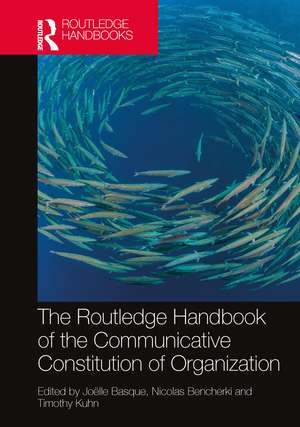The Routledge Handbook of the Communicative Constitution of Organization: Routledge Studies in Communication, Organization, and Organizing
Editat de Joëlle Basque, Nicolas Bencherki, Timothy Kuhnen Limba Engleză Hardback – 25 apr 2022
Placing communication firmly at the centre of the organizational equation, an international team of expert authors covers:
- The key theoretical inspirations and the main themes of the field
- The debates that animate the CCO community
- CCO’s methodological approaches
- How CCO handles classic management themes
- Practical applications
Chapter 5 of this book is freely available as a downloadable Open Access PDF under a Creative Commons Attribution-Non Commercial-No Derivatives 4.0 license https://www.taylorfrancis.com/chapters/oa-edit/10.4324/9781003224914-7/communicative-constitution-worlda-luhmannian-view-communication-organizations-society-michael-grothe-hammer?context=ubx&refId=6fe411e1-fbed-41c9-8d95-03ca74450c1d
| Toate formatele și edițiile | Preț | Express |
|---|---|---|
| Paperback (1) | 422.86 lei 6-8 săpt. | |
| Taylor & Francis – 4 oct 2024 | 422.86 lei 6-8 săpt. | |
| Hardback (1) | 1544.82 lei 6-8 săpt. | |
| Taylor & Francis – 25 apr 2022 | 1544.82 lei 6-8 săpt. |
Preț: 1544.82 lei
Preț vechi: 1883.93 lei
-18% Nou
Puncte Express: 2317
Preț estimativ în valută:
295.69€ • 321.30$ • 248.54£
295.69€ • 321.30$ • 248.54£
Carte tipărită la comandă
Livrare economică 21 aprilie-05 mai
Preluare comenzi: 021 569.72.76
Specificații
ISBN-13: 9780367480707
ISBN-10: 0367480700
Pagini: 584
Ilustrații: 9 Line drawings, black and white; 14 Halftones, black and white; 13 Tables, black and white; 23 Illustrations, black and white
Dimensiuni: 174 x 246 x 32 mm
Greutate: 0.45 kg
Ediția:1
Editura: Taylor & Francis
Colecția Routledge
Seria Routledge Studies in Communication, Organization, and Organizing
Locul publicării:Oxford, United Kingdom
ISBN-10: 0367480700
Pagini: 584
Ilustrații: 9 Line drawings, black and white; 14 Halftones, black and white; 13 Tables, black and white; 23 Illustrations, black and white
Dimensiuni: 174 x 246 x 32 mm
Greutate: 0.45 kg
Ediția:1
Editura: Taylor & Francis
Colecția Routledge
Seria Routledge Studies in Communication, Organization, and Organizing
Locul publicării:Oxford, United Kingdom
Public țintă
Academic, Postgraduate, and UndergraduateNotă biografică
Joëlle Basque is Assistant Professor in the Department of Human Sciences, Arts and Communication at Université TÉLUQ in Montréal, Canada.
Nicolas Bencherki is Associate Professor in the Department of Human Sciences, Arts and Communication at Université TÉLUQ in Montréal, Canada.
Timothy Kuhn is Professor in the College of Media, Communication and Information at the University of Colorado Boulder, USA.
Nicolas Bencherki is Associate Professor in the Department of Human Sciences, Arts and Communication at Université TÉLUQ in Montréal, Canada.
Timothy Kuhn is Professor in the College of Media, Communication and Information at the University of Colorado Boulder, USA.
Cuprins
Foreword: The Emerging Paradigm of Communication Constitutes Organization (CCO); Introduction; Part I: Theoretical Discussions; 1. The Theoretical Roots of CCO; 2. What’s Pragmatic about Ambiguity in the Communicative Constitution of Organizations? The Case of CCO Scholarship’s Establishment; 3. Organization as Conversation and Text; 4. Theorizing Communication and Constitution of Organizations from a Four Flows (Structurational) Perspective; 5. The Communicative Constitution of the World: A Luhmannian View on Communication, Organizations, and Society; 6. The Multiple Roles of Materiality When Communication Constitutes Organizations; 7. Disrupting CCO Thinking: A Communicative Ontology of Dis/Organization; 8. The Communicative Constitution of Organizationality; 9. The Communicative Constitution of Epistemic and Deontic Authority: Epistemological Implications of a Second-Order Construct; 10. Uncritical Constitution: CCO, Critique and Neoliberal Capitalism; 11. Queering CCO Scholarship: Examining Communication as Constitutive of (Hetero)normative Organizations and Organizing; Part II: Opening Up CCO's Methodological Approaches; 12. The Umbrella of Discourse Analysis and Its Role in CCO; 13. Acting in the Name of Others: How to Unpack Ventriloquations; 14. Ethnomethodological Conversation Analysis and the Constitutive Role of Organizational Talk; 15. Archives in CCO Research: A Relational View; 16. Adventurous Ideas for Ethnographic Research on the Communicative Constitution of Organizations; Part III: How CCO Handles Classic Management Themes; 17. Authority According to CCO: Recursivity, Emergence, and Durability; 18. CCO Theory and Leadership; 19. Exploring Identity Matters in the Communicative Constitution of Organizations; 20. What’s in a Project? Extending Inquiries into Projects with a CCO Perspective; 21. Strategic Management and CCO: A Generative Nexus; 22. The Communicative Constitution of Corporate Social Responsibility; 23. The Blue Marble Effect: Globalization, Visibility and Lenticulation; 24. Voices, Bodies and Organizations: Bridging CCO Scholarship and Diversity Research; 25. Civil Society Collaboration and Inter-Organizational Relationships; 26. Digital Media: From Tools to Agents Making a Difference; 27. The Communicative Constitution of Organizational Memory; Part IV: What Difference Does CCO Make for Practice?; 28. CCO and the Academic-Professional Gap: Combining Rigor and Relevance in Organizational Communication; 29. Where Are the Organizations? Accounting for the Fluidity and Ambiguity of Organizing in the Arts; 30. CCO in Practice: Spacing and Humanitarian Organizing; 31. Constituting the Blue-Collar Organization: How Social and Material Dimensions Are Discursively Combined to (Re)construct the Factory; 32. Constituting Hazards and Action through Communication: A CCO View of High-Reliability Organizing; 33. The Theoretical Hitchhiker’s Guide to Sensemaking, Coorientation, and Status Asymmetry; Afterword: The Emergence of the Communicative Constitution of Organization and the Montréal School: An Interview with James R. Taylor
Descriere
This Handbook offers state of the art scholarship on the perspective known as the Communicative Constitution of Organizations (CCO).












